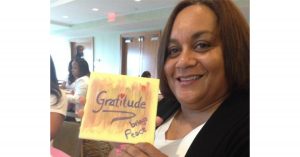Valarie E.

The nurse was supposed to be the first face I saw when the sedative medication wore off. Instead, my gastroenterologist stared at me and said “I found something. A tumor was spotted where the small intestines and colon meet.” It was a carcinoid, a neuroendocrine tumor (NET), a slow growing malignant tumor. It could have landed anywhere in my body, but I was fortunate that it was detected during my colonoscopy, the colon cancer screening test for 50-year-olds. After consultation with an oncology surgeon, the plan of action was removal by surgery.
As a woman juggling Mom duties to two teenage boys along with a demanding career position with a major health insurance company, I deliberately and promptly scheduled my procedure and recovery to accommodate work and personal commitments, including preparing for the upcoming high school senior year activities for my eldest child. I didn’t want to miss a thing and at the same time, I wanted to immediately get rid of the cancer in me.
On April 1st, I was admitted to the hospital for the tumor removal procedure, a right hemicolectomy. It was successful. I had to pass gastric milestones over the next 3 – 4 days and then I could go home for the rest of my recovery. (Sepsis and Surgery) Instead, I experienced abdominal pain, elevated white blood cell count, sluggishness, and hallucination with incoherent speech over the next week. Initially, I was told I was not walking enough, even though I walked the halls constantly. Then pneumonia was suspected but I was not given antibiotics. (Sepsis and Pneumonia)
Many clinicians checked in on me, but no one put 2 + 2 together. As my condition worsened, on Day 9, finally a CT Scan of the pelvis was ordered and it revealed a septic leak in my staple line from the surgery. Sepsis had invaded my body all while I was in the hospital. I was rushed into surgery to repair the leak. Following the surgery, I was admitted into ICU having septic shock with major multi-organ failure, acute renal failure and a stroke. I was put into a medically induced coma. This is usually fatal. Nothing but God!
Two weeks later, still alive, I came out of the coma and eventually on to physical rehabilitation. I later had additional surgery, frequent reoccurring hospital stays, mental therapy and chronic ailments, some of which continue to this day.
The delay in originally diagnosing sepsis led to my compromised condition. That was in 2010. Now, I’m an advocate to educate others about sepsis and to recognize the early signs of sepsis. I missed all that I had planned during that time, including spending Mother’s Day with my family and witnessing my son’s commencement ceremony. Although, my journey has been full of hurdles, I am truly grateful to have survived this horrendous condition.
I’m still making plans while asking for God’s blessing that I will be successful in carrying them out.


























